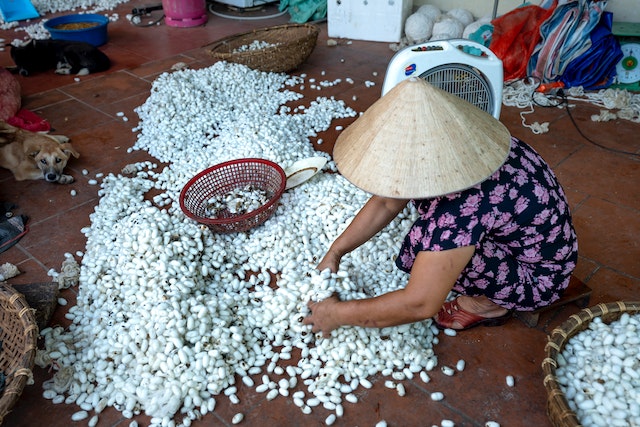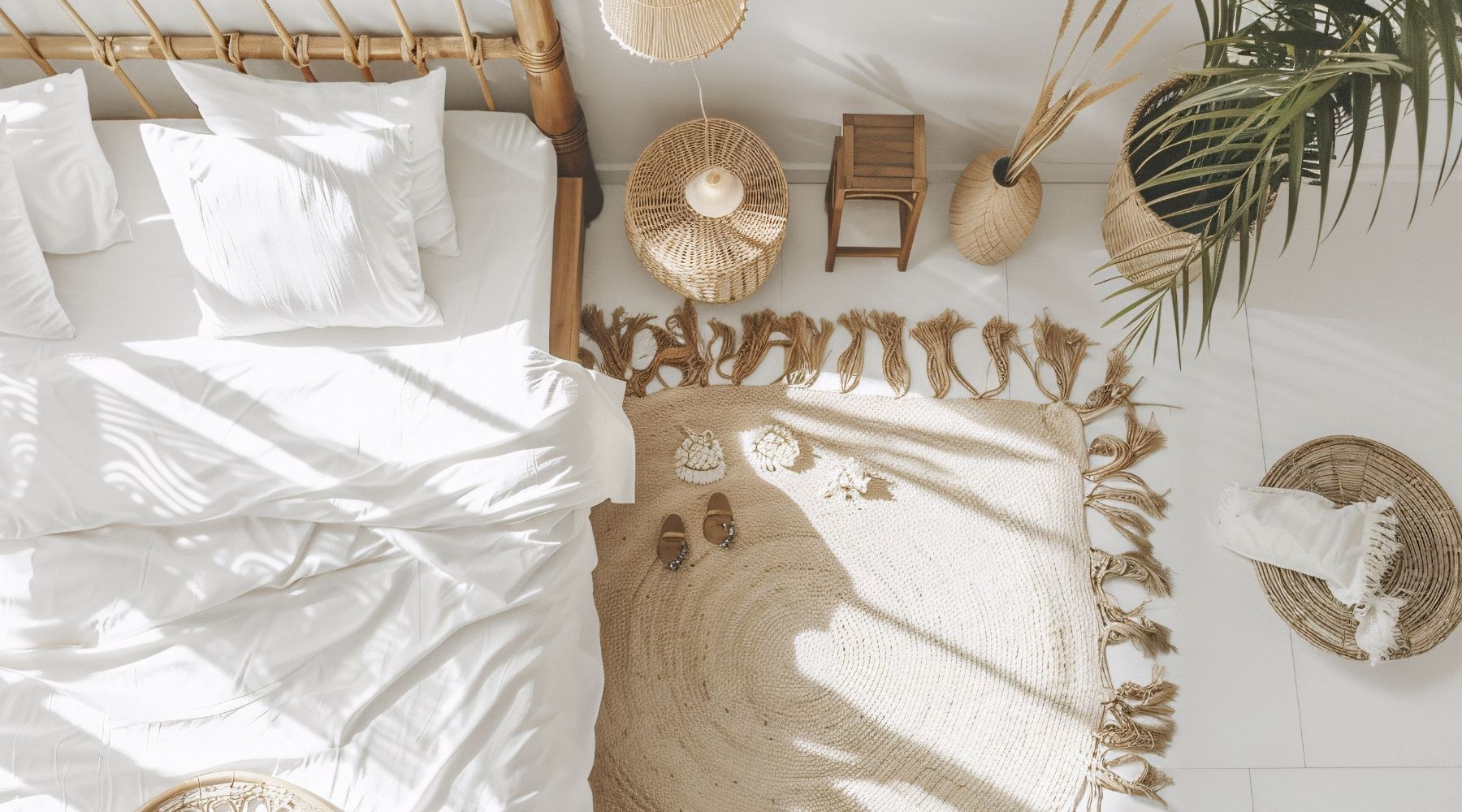Silk has long been associated with chic luxury and high quality, but it’s equally important to be aware of the popular product’s disadvantages before investing in your next bedding bundle. To help you out, we’ve outlined five critical disadvantages of silk bedding and a selection of equally-soft alternatives to consider.
The disadvantages of silk bedding
Of course, we’ve all heard the benefits of silk and how it’s among the most luxurious fabrics available. Though while there are significant advantages to this popular material, there are also a series of essential disadvantages you should be aware of.
1. Real silk is unethical
One of the main disadvantages of silk is its unethical manufacturing process. In short, to produce genuine silk bedding, silkworms are boiled alive in their cocoons, after which the silk is carefully extracted and woven into the luxury fabric. In fact, it typically takes around 2,500 silkworms to produce just one pound of silk.
Fortunately, it is possible to collect the silk in a much more ethical manner, which involves allowing the silkworm to emerge from its cocoon before extracting the silk. The catch is that this represents only a small section of the silk market, and the resulting product is often of a lower quality due to the damaged cocoon fibres.
You can read more in our handy guide about the differences between normal and organic silk.

2. Real silk is expensive
Typically, real silk can be extremely expensive, especially if it’s of high quality. In fact, a high price can be a strong indicator that the silk you’re buying is at least likely to be authentic.
However, this can sometimes make it an unattainable material, and you can easily spend the same amount on one silk pillowcase as you could on a full bedding set of an alternative textile.
Of course, you will find merchants offering cheap silk at affordable prices, though there are a couple of key reasons to be sceptical of low-cost offers:
- It can be unsafe: It’s not unlikely that the manufacturing process included various harmful chemicals to cheapen the overall product.
- It won’t be pure silk: When buying supposed silk for a price that’s too good to be true, the reality is that you’re probably buying a blend of silk and synthetic materials like silicone or polyester. While you may not be able to noticeably tell the difference, you’ll forsake all the real benefits of the true product.
- It will be low quality: Often, when you buy silk, you get what you pay for. So, because it’s highly unlikely that cheap silk is the genuine article, the quality will be far lower. It’ll feel flimsy and be more prone to rips and general wear and tear.
3. Real silk fades when exposed to sunlight
Because silk is a natural textile, it is prone to fading when left in sunlight – whether left out on the washing line or by a window. With this in mind, it’s important to air dry your silk sheets, pillowcases, and duvet covers inside and away from the sun.
Importantly, failure to do so will result in more than just disappearing colours. You’ll also damage the fibres and weaken the overall integrity of the fabric, which can significantly reduce the lifespan of your bedding, as well as invite snags and tears.
4. Real silk is tricky to care for
Real silk is soft, smooth, and exceptionally gentle to touch, which makes it a highly comfortable sleeping solution all year round. However, it’s also a relatively high-maintenance textile, as a result of it being remarkably delicate. This can make it quite tricky to care for, especially if you lead a busy life. For example:
- You’ll need to use mild, specialist detergents that are suitable for silk products. Keep an eye out for words like ‘delicates’ when browsing soaps. Using an inappropriate detergent can damage your fabric.
- You’ll need to wash your silk on a low temperature. It can also be helpful to keep your bedding in a mesh laundry pouch to prevent snags and tears.
- As highlighted, you’ll need to dry your silk bed sheets inside and away from sunlight.
- You need to take care when ironing silk, ensuring you’re always placing a cloth between your bedding and the iron. Alternatively, hang your spare silk bedding in a cool, dry place when not in use.
5. Real silk can be slippery
While real silk’s elegant sheen is one of its favoured qualities, and the softness has numerous hair and skin care benefits, its smooth texture is also regarded as one of the major drawbacks.
Among the main disadvantages of silk, the glossy fabric can quickly start to feel slippery, especially if it’s a lower-quality blend, which often impacts overall sleep experience and comfort.
The alternatives to real silk bedding
There’s no denying that silk is a premium bedding fabric. However, it’s not always the right choice, for the reasons outlined above - especially, if you’re concerned about cost, care, and the ethical impact of your purchases. Fortunately, there are a few practical alternatives to silk bedding that offer the same luxurious softness.
Egyptian cotton
A classic favourite, Egyptian cotton is a luxury alternative to silk that doesn’t compromise on quality. Traditional Egyptian cotton is sourced from long-staple cotton fibres grown on the fertile banks of the Nile, though modern manufacturing allows it to be grown globally.
An upgrade on regular cotton, advantages of Egyptian cotton include:
- It gets softer with every wash.
- A high thread count improves softness and overall comfort.
- Offers long-lasting durability and a consistent finish.
- It’s temperature regulating and breathable, keeping you cool in summer and warmer in winter.
- It’s non-irritant or itchy, making it a great pick for sensitive skin.
- The high-quality means you’re unlikely to experience any pilling.
- While more expensive than regular cotton, it’s typically a cost-effective, long-term investment.
Bamboo

Unsurprisingly, bamboo bedding is sourced from the fast-growing and renewable bamboo plant. An excellent, ethical alternative to silk, bamboo sheets offer the same soft and sleek feel, as well as a string of other valuable benefits:
- Eco-friendly and sustainable (bamboo shoots are fast growing and self-regenerative).
- Biodegradable, taking just one year to degrade once submerged in soil.
- Among the softest fabrics to choose from (silkier than Egyptian cotton).
- Naturally temperature regulating.
- Moisture-wicking and highly breathable, meaning each night will be cool and comfortable.
- Won’t lose its colour during washes.
- Hypoallergenic and an inhospitable environment for mites and mould.
- Long-lasting and highly durable.
Learn more in our guide explaining the differences between Egyptian cotton and bamboo bedding.
Eucalyptus ‘silk’

Finally, eucalyptus silk is the ideal alternative to traditional silk, sourced from trees grown in sustainable forests and developed to produce a luxury fabric that competes in any home.
Eucalyptus trees are harvested, processed, and broken down to generate a pulp, which is then fed through fine holes to produce thread, which is spun and woven. This process is globally recognised for its positive environmental impact. However, other benefits of eucalyptus silk include:
- A superior-quality material that’s favourable for sleepers with sensitive skin.
- Highly breathable and moisture-wicking.
- 95% less water used in production than cotton, and 30% less energy.
- A carbon negative supply chain.
- Hypoallergenic and anti-bacterial.
- Naturally temperature regulating, helping to keep you comfortable, whether it’s warm or cool.
- Healthier hair and skincare.
Hopefully, you now have a thorough understanding of the disadvantages of real silk bedding, and the potential alternatives you might want to consider instead. In the meantime, head on over to the Ethical Bedding blog for even more useful insight like this.
FAQs
We’ve answered a few of the most common questions asked about silk bedding, but if you’re still unsure of anything, don’t hesitate to get in touch with our team of sleep experts.
How much does a silk pillowcase cost?
Eucalyptus silk is considered to be a luxury product, though you can buy a pillowcase bundle for as little as £35. Buying a eucalyptus and bamboo pillow will also cost less than £40.
How do you clean real silk bedding?
Because silk is exceptionally delicate, it’s important to take gentle care when washing. This means washing on a low heat and keeping your silk bedding in a mesh bag to prevent damage in the machine.









Share:
What Are The Blanket Sizes In The UK? Sizes & Dimensions
16 zen bedroom ideas